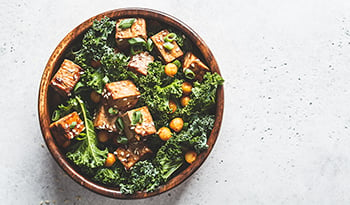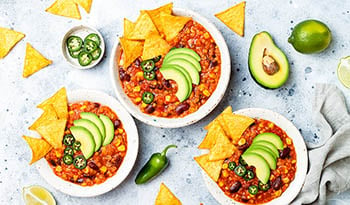Vegetarian Diet Benefits + 4 Key Supplements
DISCLAIMER:This blog does not intend to provide diagnosis...
- In this article:
- Types of Vegetarian Diets
- Health Benefits of a Vegetarian Diet
- Guidelines for a Healthy Vegetarian Diet
- 4 Important Supplements for the Vegetarian Diet
- 1. Vitamin B12
- 2. Iron
- 3. Zinc
- 4. Iodine

Originally posted June 2018 / Updated March 2023
A vegetarian diet consists of plant-based foods and omits meat, poultry, fish, and other animal foods.
Types of Vegetarian Diets
There are several types of vegetarian diets, with the vegan diet being the most restrictive.
- A vegan diet focuses solely on plant-based foods like vegetables, fruit, legumes, grains, nuts, and seeds.
- A lacto-ovo-vegetarian diet allows eggs and dairy products.
- A lacto-vegetarian diet allows dairy products.
- The ovo-vegetarian diet allows eggs.
- The pesco-vegetarian or pescatarian diet allows fish.
Health Benefits of a Vegetarian Diet
Generally, a higher intake of plant foods and a lower intake of animal foods is associated with reduced risk of heart disease, cancer, obesity, osteoporosis, and type 2 diabetes. It also lowers the risk of death due to heart disease and lowers all-cause mortality. However, it is important to differentiate between a healthy vegetarian diet from an unhealthy vegetarian diet. The research indicates that if the vegetarian diet is high in high-glycemic foods such as products from refined grains (e.g., white flour), fruit juices, sugar‐sweetened beverages, sweets, and desserts, it does not provide the same health benefits as a healthier vegetarian diet. Eating a “junk food” based vegetarian diet produces a higher risk of heart disease, type 2 diabetes, and all-cause mortality.1-4
A vegetarian diet is associated with a lower body mass index (BMI) and a reduced risk of obesity. Vegan diets have been shown to be more effective for weight loss than an omnivorous, lacto-ovo vegetarian, or a pesco-vegetarian diet. Replacing animal foods that are high in fat and calories, with low-calorie plant foods, or even nutrient-dense plant foods such as nuts and seeds, appears to help people manage their body weight more effectively.5,6
Eating a vegetarian diet may even help to reduce the risk of cancer.3 This result is somewhat expected as a diet rich in plant foods is high in dietary fiber and phytochemicals (biologically active compounds found in plants) that fight against cancer.3
Guidelines for a Healthy Vegetarian Diet
Here are some key guidelines for enjoying a healthy vegetarian diet.
- Focus on Eating a Variety of Health-Promoting Foods – it is especially important to eat a high variety of foods when on a vegetarian diet. One easy way to do this is to select produce from all the colors of the rainbow as much as possible. This practice will ensure a wide range of health-promoting carotenoids and flavonoids. Also important is to mix up the selection of high-protein plant sources such as legumes, nuts, and seeds.
- Only Consume Whole Grain Products – Use brown rice vs. white rice, and whole grain bread vs. white bread. And take advantage of the increased availability of ancient grains like quinoa and spelt.
- Pump Up the Protein – Since protein intake in vegetarians can be insufficient, especially in athletes, using vegan protein powder supplements to boost protein intake is a great idea. Protein is critical in building muscle mass, controlling blood sugar levels, supporting immune function, and supplying the essential building blocks for overall health. Taking 20-25 grams of vegan protein in the morning as part of a health-promoting smoothie or shake is a fantastic way to boost protein intake in vegans. Vegan sources include pea, hemp, pumpkin, soy, rice, and quinoa.
- Avoid Vegetarian Junk Food – just because something is vegetarian does not necessarily mean it is healthy. Read food labels carefully to ensure the food is not too high in sugar.
4 Important Supplements for the Vegetarian Diet
Generally, nutrient intake status for most nutrients is lower in vegetarians than meat-eaters. Particularly important to highlight are vitamin B12, iron, zinc, and iodine. These nutrients should be taken as dietary supplements by vegetarians.7,8
1. Vitamin B12
Vitamin B12 is found in significant quantities only in animal foods. The richest sources are liver and kidney, followed by eggs, fish, cheese, and meat. Vegetarians are often told that fermented foods like tempeh are excellent sources of vitamin B12. However, in addition to the tremendous variety of B12 content in fermented foods, there is some evidence that the form of B12 in these foods is not exactly the form that meets our body's requirements and is, therefore, useless. The same holds for certain cooked sea vegetables.
Research shows that it is essential that vegetarians supplement their diets with vitamin B12.7 There are several forms of B12 available in several forms. The most common supplemental form is cyanocobalamin. However, methylcobalamin is more active. For vegetarians, a daily dosage of 1,000 mcg of methylcobalamin is recommended.
2. Iron
Iron is another nutrient that vegetarians often lack, especially in menstruating women and during pregnancy. Iron is critical to human life. It plays a central role in the hemoglobin molecule of red blood cells (RBC). It transports oxygen from the lungs to the body’s tissues and carbon dioxide from the tissues to the lungs. Iron also works in several critical energy production and metabolism enzymes, including DNA synthesis.
Iron deficiency is the most common nutrient deficiency in the United States. The groups at highest risk for iron deficiency are infants under two years of age, teenage girls, pregnant women, and the elderly. Studies have found evidence of iron deficiency in as high as 30-50% of people in these groups and even higher in vegetarians.
3. Zinc
Zinc intake is also often insufficient in vegetarians. That results in significant disruption in body processes, especially immune function. In short, without adequate zinc intake, we lose the ability to fight off viruses and regulate overactive immune responses that lead to inflammation.
Taking a zinc supplement is recommended for vegetarians. In adults, the usual dosage range for zinc supplementation for general health support and during pregnancy or lactation is 15 to 20 mg. For children, the dosage range is 5 to 10 mg.
There are many forms of zinc to choose from. While many clinical studies have utilized zinc sulfate, this form is not as well absorbed as other forms such as zinc picolinate, acetate, citrate, bisglycinate, oxide, or monomethionine are all excellent forms of zinc.
4. Iodine
Iodine intake in vegetarians tends to be lower, presumably due to reduced iodized salt and seafood intake. Consuming seaweeds such as wakame, kelp, nori, and kombu is an option. Still, to ensure sufficient intake, vegetarians should take the recommended dietary intake of 150 mcg in adults, 220-250 mcg in pregnant women, and 250-290 mcg in breastfeeding women.
References:
- Kim H, Caulfield LE, Garcia-Larsen V, et al. Plant-Based Diets Are Associated With a Lower Risk of Incident Cardiovascular Disease, Cardiovascular Disease Mortality, and All-Cause Mortality in a General Population of Middle-Aged Adults. J Am Heart Assoc. 2019 Aug 20;8(16):e012865.
- Kim H, Caulfield LE, Rebholz CM. Healthy Plant-Based Diets Are Associated with Lower Risk of All-Cause Mortality in US Adults. J Nutr. 2018 Apr 1;148(4):624-631.
- Dinu M, Abbate R, Gensini GF, Casini A, Sofi F. Vegetarian, vegan diets and multiple health outcomes: A systematic review with meta-analysis of observational studies. Crit Rev Food Sci Nutr. 2017 Nov 22;57(17):3640-3649.
- Kim J, Kim H, Giovannucci EL. Plant-based diet quality and the risk of total and disease-specific mortality: A population-based prospective study. Clin Nutr. 2021 Dec;40(12):5718-5725.
- Turner-McGrievy GM, Davidson CR, Wingard EE, et al. Comparative effectiveness of plant-based diets for weight loss: a randomized controlled trial of five different diets. Nutrition. 2015 Feb;31(2):350-8.
- Kahleova H, Petersen KF, Shulman GI, et al. Effect of a Low-Fat Vegan Diet on Body Weight, Insulin Sensitivity, Postprandial Metabolism, and Intramyocellular and Hepatocellular Lipid Levels in Overweight Adults: A Randomized Clinical Trial. JAMA Netw Open. 2020 Nov 2;3(11):e2025454.
- Neufingerl N, Eilander A. Nutrient Intake and Status in Adults Consuming Plant-Based Diets Compared to Meat-Eaters: A Systematic Review. Nutrients. 2021;14(1):29.
- Pawlak R, Berger J, Hines I. Iron Status of Vegetarian Adults: A Review of Literature. Am J Lifestyle Med. 2016;12(6):486-498.

 By Dr. Michael Murray, N.D.
By Dr. Michael Murray, N.D. 


